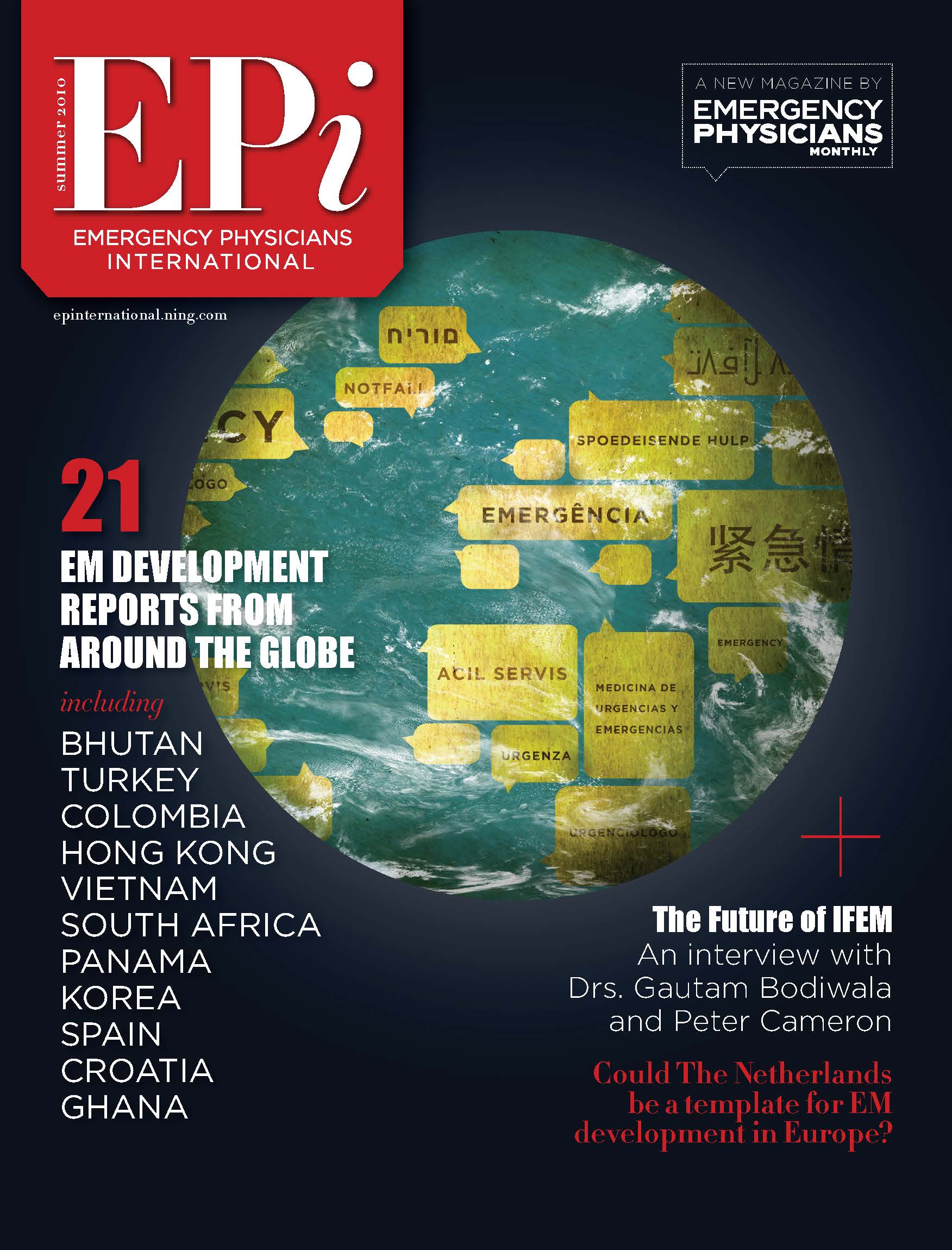Stressed-Out Residents, Tele-Triage and the Future of EM, with Dr. Peter Cameron
Peter Cameron has been active in global emergency medicine development for thirty years, spending much of that time in executive leadership at the International Federation for Emergency Medicine (IFEM). As president of IFEM, Cameron brought a steady hand and a dry Australian wit, overseeing a period of significant growth. Today, in addition to serving on the editorial board here at Emergency Physicians International, Cameron is the academic director of the emergency and trauma center at The Alfred, the biggest trauma center in Australia and New Zealand. He’s also a professor of emergency medicine at Monash University. Describing himself as being in the “twilight” of his career Cameron dedicates much of his time now to mentorship, so we wanted to catch up with him to learn about the next generation of emergency physicians. We also cover leapfrog innovation, and the promise of virtual care in emergency medicine.
EPI: You’ve been involved in global emergency medicine for thirty years. How would you describe the pace of change over that time? Has the pace of development increased?
Peter Cameron: I wouldn’t say the pace of development has sped up, but the way we communicate has, with social media and so forth. We now communicate more efficiently. Which can be a positive, but sometimes trends take off that shouldn’t.
EPI: What kinds of trends have you seen take off on social media that maybe needed a little more consideration?
Cameron: I think of particular treatments, like factor 7 was very popular, then it wasn’t shown to make a lot of difference. Then we’ve had fads with airway techniques. A lot of these fads aren’t based on evidence; they’re based on personalities. Even though we’ve talked about evidence-based medicine since the 1990s, we’re still very much focused on eminence–based medicine. I wouldn’t necessarily call them influencers, but it’s effectively the same. Most of the time it doesn’t do a lot of harm, but it diverts people from what’s important.
EPI: What has surprised you about the progression of emergency medicine over the last 30 years?
Cameron: One of my mentors who recently died, Joseph Epstein, told me years ago that I needed to get into computing, into electronic medical records, because everything was going to go digital. He encouraged me to get in on the ground floor. Thirty years later, electronic medical records are still a pretty clunky beast. The ability to link data sets is difficult. Unless you’re moving within a single health system, access to data is difficult. The ability to track patients is problematic. In places like Australia and other high income countries, you would have expected to have moved a lot further forward in this area.
Some of that slowness has been deliberate. We’ve needed to be mindful of confidentiality and patient privacy. There are some benefits to not being able to access every record all the time. But as a practitioner, I can have a patient arrive at my emergency department and know nothing about them. I might do the wrong thing for them because I don’t have access to their patient data.
EPI: As you mentor younger physicians, what trends are you noticing in the next generation?
Cameron: It’s a funny thing. We did some burnout surveys about thirty years ago and we talked about those things some. But today, virtually every day there’s something being said or shared about burnout or wellbeing. These days, most of the clinicians working in Australia are working 38 or 40 hour weeks and they’re more stressed than I’ve ever seen. We used to work 100 hours in a week, sleep overnight in the hospital . It was no big deal. Once we were a third-year resident, we were pretty much left on our own, unsupervised, no support. There were patients who died unnecessarily, and all sorts of other things going on, but somehow, we were able to deal with that. Today, on the other hand, every resident has supervisors. They don’t work unaided, they work short hours, and they’re more stressed than ever. It’s an interesting dynamic.
EPI: To what do you attribute that increase in stress levels in young physicians?
Cameron: It’s about expectations. My expectation was that I’d do the best I could and inevitably- bad things would happen. Now, there’s an almost court martial inquiry into every little misstep. There’s this intense pressure. I don’t know that it’s helpful. Maybe it’s how we deliver the message that is the problem. There’s no doubt that I’ve never seen so much stress in the junior doctors.
EPI: If you could wave a magic wand and change a policy that helped to reduce that stress level – without reducing quality – what would you do?
Cameron: I think it’s about culture. How I respond to what the junior doctors do has a big impact on how they behave. I have to tell them that poor outcomes happen sometimes. I can encourage them to do better next time while still encouraging them that everyone makes mistakes. That’s a lot different than critiquing every action.The way we handle that feedback and support is important.
The other thing that’s feeding into this is the legal aspect. In Australia, they keep changing the expectations around what’s standard of care and I think the more we can go towards standardized guidelines the better. Take chest pain for example. Inevitably, a patient is going to die. It may have nothing to do with what the doctor did. But the impact of that on the clinicians is huge. If the clinician has followed the guidelines, that should be that. That death shouldn’t involve reciminiation.
EPI: Is the problem of stress in junior doctors that you’re describing unique to high-income countries where regulations and litigation have gotten out of hand? What are you seeing in countries where emergency medicine is still in its early stages of development?
Cameron: It’s global, but obviously if you’re in the middle of a disaster – like working in Ukraine at the moment – medico-legal issues aren’t your main concern. On one hand it’s a luxury to have the degree of scrutiny that I’ve described. But on the other hand, it makes working life a bit less enjoyable.
EPI: As you mentor young doctors, what gets you excited about the next generation of emergency medicine?
Cameron: I love the enthusiasm of the younger doctors. A lot of them are really well trained and have skills that I wouldn’t have thought possible, in areas like ultrasound and procedural skills. These were the things we dreamed of in my time, and now it’s routine.
EPI: What are some of the challenges you’re seeing in regions where emergency medicine is still early in development?
Cameron: Looking at places like the Pacific and India, where I’m more familiar, I think coordination of emergency services is one of the biggest issues. I’m talking about pre-hospital to hospital and then beyond. A country might do a good job of shining a bright light on the emergency department and saying, “come on down if you’re sick,” but if there’s no primary care system around that, it will get overwhelmed quickly. That’s a problem in any region where community health services are not provided.
EPI: In your 30 years as a global EM leader, have you seen ways in which some emergency medicine systems have learned from the mistakes of others and leapfrogged over them in development?
Cameron: So much is dependent on context. I think what’s happened with Lee Wallis down in South Africa with regard to pre-hospital care and using EMTs and so forth was fantastic. Lee and his team trained EMTs in very basic life-saving skills in order to help get patients to the hospital faster, rather than training them for four or five years, the way we do it in Australia. Our pre-hospitals providers are quite good, but it’s just not logical to do that in a resource-constrained environment. Their way of training pre-hospital providers and then triaging them using a jurisdiction-wide pre-hospital system was right for their context. Utilizing the same principles that we would use, but adapting them to a low-resource environment was quite impressive.
The reality is that the majority – 80% – of what we do in emergency medicine doesn’t cost a lot of money. But the last 5-10% costs a hell of a lot of money. Once you start getting MRIs and calling neurosurgeons, that’s expensive. But just stopping the bleeding, maintaining the airway, that’s pretty simple and basic and doesn’t have to break the bank.
EPI: What have been your observations of how COVID-19 pushed us towards virtual medicine?
Cameron: In Australia today we’re looking at the idea of the virtual ED very closely. There are a number of different models, but I will say that it’s quite chaotic. The strategic policymaking is more reactive than proactive, and policymaking-on-the-run generally ends badly.
We’re using virtual ED concepts in a number of different ways. We’re using it to reduce unnecessary transfers, whether for an older person in a residential home, or from a GPs office, or from a rural ED.
With staffing shortages, people have also been using virtual senior doctors in the waiting room, putting them on a computer and wheeling them around and checking people out. We’ve also used the same technique for supervising junior doctors in remote facilities.
EPI: What advancements in virtual care are you most excited or optimistic about?
Cameron: Certainly, not transferring patients unnecessarily from residential-care facilities is a big deal. We have facilities that are under-nursed. Patients are cared for by attendants rather than nurses, and their inclination is to press the “eject button” rather quickly. Often it’s not appropriate. By having a skilled person review the case virtually, they can be managed in place. That’s important.
The other big benefit of virtual care is in tapping into specialty expertise. In a city you may have advanced specialists at a trauma center, but that should be a center without walls. If you look at my state of Victoria there are a couple of trauma centers. They should be providing that high level expertise to other hospitals virtually without patients having to be transferred.
One of the issues, however, is funding. If I give an opinion over the phone or over a virtual platform, there’s still no payment as such. But when the patient comes to my ED and the surgeon says “we’re not going to operate,” we get paid for that. So the funding has to match where the skills and time reside. There’s a bit of work that needs to be done on that front. There’s also some potential for abuse of the system- that we have to be aware of.
We need more research on virtual emergency medicine, to understand the value and impact and how it should be reimbursed. The evidence is too slim right now.
EPI: Final words of wisdom to the world of global emergency medicine?
Cameron: Keep on trucking. The main thing I’d say is that COVID is now endemic and I think we need to move on. I think the UK is probably the most advanced in that process. Australia is still chaotic in terms of our public health system. We’re treating COVID like a special disease. In my mind, it’s now no different than the flu and we should treat it as such. We’re still facing record ambulance ramping, record access block, and canceledx` elective surgeries. If we didn’t force staff to be on sick leave, if we didn’t have all of these excessive isolation practices, I reckon we’d be 10-20% better off. In Australia, I think it’ll take another year to get there.






